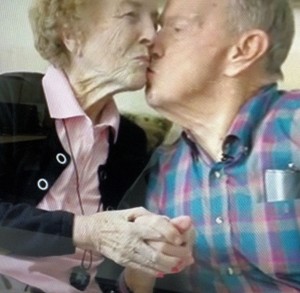
Today I was asked a good question; a question in which the answer takes thought, careful consideration and for which the answer could divide families. The question? “How can hospice care be about quality of life when you are deciding not to treat someone anymore but to accept that they are dying? Isn’t this giving up?”
If you have not yet faced the diminished quality of life that goes with a hospital stay for an elderly person, or with a chronic untreatable condition, this could seem like a tough one. Let me describe poor quality of life first, through an example of my own, and then we can get to the hospice discussion on common ground.
My beautiful and wonderful mother, Priscilla had a 2 week hospital stay last fall. The hospital was excellent and I truly cannot say enough about the nurses and doctors. But here is what a hospital stay in even the best of circumstances can do for someone with dementia or for an elderly person: it can increase suffering while attempting to improve health.
This sounds harsh and I may take some heat for being so blunt. In way of explanation I will describe our experience.
Priscilla’s day in November of 2013 started at the doctor’s office as she had not been eating. Her blood pressure was quite low and therefore off she went to the emergency room. My father and I sat with her in the cold emergency room for 7 hours during which the stroke team was activated for a middle aged man and 5 ambulances arrived. This level of activity is not unusual for emergency rooms these days and given decreased staffing that has come with Medicare and Medicaid shortfalls, it translates to waiting. My mother did not have an obvious “emergency” so attention was sporadic. Six hours in and her blood work came back with an elevated cardiac enzyme. Heart attack? Not sure. Fluid around her lungs seen on an x-ray. Pneumonia? Not sure. But enough to admit.
During the 2 week stay my mother was on complete bed rest for 48 hours and reached a point of being so weak she could not sit up or maintain sitting on her own. Blood was drawn every morning at 5 am. Every morning. Every single morning she was woken up and poked with a sharp needle at least once but more often 2 or 3 times as she does not have easy veins to poke.
She lost 17 pounds. She stopped talking and ate only sporadically. She was confused and I believe she was scared. All she wanted was to be with her family, mostly my father. If you know my mother, she is the sweetest lady you know. She never wants to trouble anyone, even her children. She always puts us first. But when we asked her if she wanted us to stay overnight she did not hesitate to say yes. This was a clear statement of “I’m scared.”
There were nights when we were not certain of whether my mother would see the sun rise in the morning.
It turns out my mother did have a heart attack but was never seen by a cardiologist. Not to blame. She is not a candidate for surgery and is on all the correct medications already. There was nothing the cardiologist could do. Four different hospitalists attended to her care, all excellent, all with nothing to add.
And at the end of the 2 weeks, too deconditioned and weak to go to the one place she wanted to go—home, she had to go to rehabilitation. Another 7 week journey and finally home to be with my dad.
So I have to ask: what if my mother passed away during the hospital or rehab stay? Then the one thing she wanted most, to be with her husband at home, would not have been completed. To me and to my family, that is poor quality of life.
So when it came time to talk hospice we were ready. We are certain we are not giving up or predicting death. Only God knows when this inhalation will be followed by our very last exhalation. Meanwhile steps are in place to stay home through thick and thin.
When nothing more can be done to increase our days, we should increase the quality of our days. Be with the ones you love and be treated in a manner that rejoices in your life.

